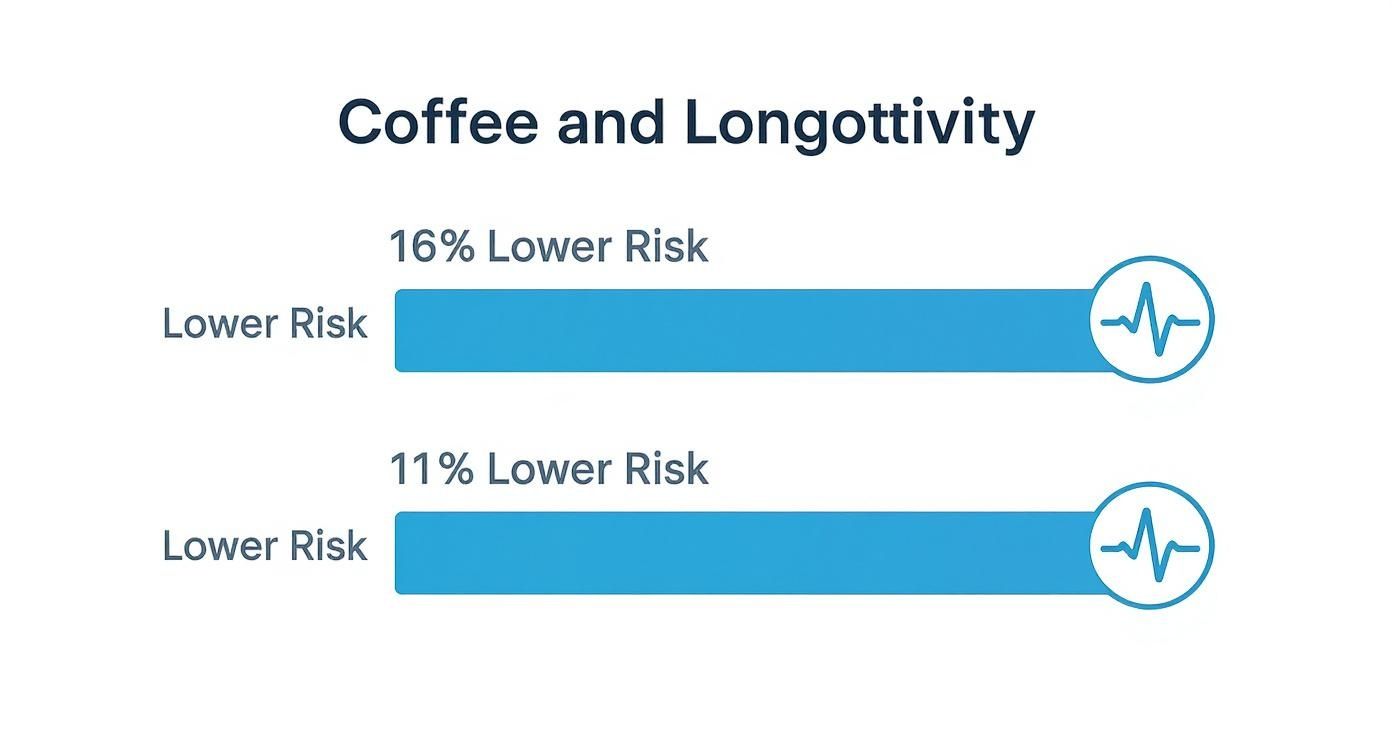Yes, when enjoyed in moderation, instant coffee is good for you. It packs many of the same powerful health benefits as a regular cup of brewed coffee, including a healthy dose of antioxidants. Despite what you might have heard, its convenience doesn't mean you have to compromise on wellness.
Debunking the Myths About Instant Coffee

For years, instant coffee has been stuck with a bad rap—often seen as the less sophisticated, less healthy sibling to traditionally brewed coffee. But is that reputation really fair?
If you look past the coffee snobbery, the science tells a much different story. At its core, instant coffee is just brewed coffee that's been dehydrated. The process is designed to preserve many of the original coffee bean's most valuable compounds.
This means you’re still getting a significant dose of antioxidants, those amazing little molecules that help fight cellular damage and reduce inflammation in the body. While the manufacturing process does slightly alter the final nutritional profile, the core benefits are surprisingly well-preserved. It's a bit like the difference between fresh and frozen vegetables—both are packed with nutrients, even if their textures aren't identical.
A Quick Health Snapshot
To really get a feel for whether instant coffee is a good choice for you, it helps to see how it stacks up against its brewed counterpart.
Here’s a quick comparison of the key health-related components in instant and brewed coffee.
Instant Coffee vs Brewed Coffee At a Glance
| Health Aspect | Instant Coffee | Brewed Coffee |
|---|---|---|
| Antioxidant Levels | High, but slightly lower than brewed. | Very High. |
| Caffeine Content | Typically 60-90mg per cup. | Typically 70-140mg per cup. |
| Acrylamide Levels | Slightly higher, but well within safe limits. | Slightly lower. |
| Nutrient Retention | Good, contains potassium and magnesium. | Excellent, slightly higher nutrient levels. |
As you can see, the differences are pretty minimal. The most important thing is that both forms of coffee can contribute positively to your health.
Observational studies have repeatedly linked regular coffee consumption—including instant—to a lower risk of serious health issues like type 2 diabetes and liver disease. In fact, many people see the best results from drinking 3–5 cups of instant coffee daily. You can discover more about these health associations on Healthline.com if you want to dive deeper into the research.
Ultimately, the convenience of instant coffee makes it an incredibly easy way to tap into these protective benefits every single day.
Beyond that morning jolt, could your simple cup of instant coffee actually be helping you live a longer, healthier life? It sounds almost too good to be true, but a surprising amount of research points to yes. It turns out regular coffee drinkers, and that includes those of us who prefer instant, often reap some serious longevity benefits.
When scientists dig into longevity, they look at something called "all-cause mortality." It's a clinical-sounding term, but it just means the risk of death from any cause—heart disease, cancer, you name it—over a certain period. Time and again, studies find that coffee drinkers have a lower risk, suggesting coffee offers a protective effect that adds up over a lifetime.
The Protective Shield in Your Mug
So, what's the secret? A big piece of the puzzle is coffee's impressive supply of antioxidants. You can think of these as a microscopic security detail for your body's cells.
Every single day, our cells are under attack from unstable molecules called free radicals, which cause the kind of damage that leads to aging and disease. Antioxidants are the good guys that step in and neutralize these threats. While the exact antioxidant mix in instant coffee is a bit different from brewed, it still packs a powerful punch against this daily wear and tear.
This constant defense helps cool down chronic inflammation, which we now know is a major culprit behind many age-related illnesses. In that sense, every sip is contributing to a stronger, more resilient cellular foundation—a key to living well for longer.
By helping to safeguard your cells from damage, the compounds in instant coffee play a direct role in promoting long-term health and potentially extending your years.
The Science Behind a Longer Life
The most convincing evidence comes from massive, long-term studies. We're not talking about small groups; these studies follow hundreds of thousands of people for decades, giving us a really clear picture of how habits like drinking coffee impact health. The verdict is consistently positive and shows that enjoying instant coffee is good for you.
One landmark UK study, for example, tracked over 500,000 people for a decade. It found that folks drinking 6–7 cups of coffee per day, including instant, had a 16% lower risk of early death than non-drinkers. Another huge European study with nearly half a million participants found that over 12 years, instant coffee drinkers had an 11% lower risk of dying from any cause. You can learn more about these coffee findings and the research behind them.
These aren't just abstract numbers. They represent a real health advantage tied to a simple, enjoyable daily ritual. It's solid confirmation that your convenient cup is more than just a quick pick-me-up; it's a science-backed choice for a longer life.
What's Actually In Your Instant Coffee?
When you stir a spoonful of instant coffee into hot water, what are you really putting into your body? It all starts with the same coffee beans used for a fresh brew, but the journey to becoming "instant" tweaks its nutritional makeup in a few important ways.
First, let's talk about the big stuff: macronutrients. A simple cup of black instant coffee has a tiny, almost non-existent, amount of calories, fat, protein, and carbs. Its real power isn't in what it has, but in what it doesn't have. If you want a deep dive on this, check out our complete guide to instant coffee calories. The true nutritional value comes from the micronutrients and potent plant compounds that survive the production process.
The Good Stuff: Key Compounds and Their Role
Just like its brewed cousin, instant coffee is packed with antioxidants. Think of these as your body's personal security detail, protecting your cells from damage. The star players here are a group of antioxidants called polyphenols, which include powerhouse compounds like chlorogenic acids.
Now, here's the catch. The dehydration process that makes coffee instant does dial down the concentration of these beneficial compounds. One study found that traditionally brewed coffee can have more than four times the amount of these phenolic compounds compared to an instant version made from the exact same beans. You can see the research for yourself over at GoodRx.com to get the full picture.
So, while instant coffee is good for you and definitely gives you a solid antioxidant hit, you'd have to drink a bit more of it to match the levels you'd get from a single cup of fresh brew.
Nutritional Showdown: Instant vs. Brewed Coffee
To really see the differences, let's put them head-to-head. The table below breaks down the key components in a standard cup, giving you a clear snapshot of what’s in your mug.
This data chart shows a fascinating link between coffee consumption and a lower risk of early death, reinforcing the overall health benefits we're talking about.

The visualization really drives home the point, showing significant drops in mortality risk tied to drinking coffee regularly—and yes, that includes instant.
Nutritional Showdown Instant vs Brewed Coffee (per serving)
Here's a closer look at what you're sipping. While the numbers vary by brand and bean, this gives you a great general idea.
| Nutrient/Compound | Average in Instant Coffee | Average in Brewed Coffee | Significance |
|---|---|---|---|
| Caffeine | 60-90 mg | 70-140 mg | Affects energy, focus, and metabolism. |
| Potassium | ~100 mg | ~120 mg | An essential mineral for heart and muscle function. |
| Magnesium | ~7 mg | ~8 mg | Important for energy production and nerve function. |
| Acrylamide | 200-400 ppb | 100-200 ppb | A compound formed during roasting. |
You might notice instant coffee has slightly higher levels of acrylamide, a compound that forms when starchy foods are cooked at high heat. Don't let that scare you. The amounts are well below established safety limits and are comparable to what you'd find in everyday foods like potato chips or a piece of toast.
At the end of the day, instant coffee holds its own as a healthy drink. It delivers essential minerals and a good dose of antioxidants with almost no calories, making it a perfectly smart and convenient part of your daily routine.
Boosting Your Brain and Body with Instant Coffee

Beyond the long-term health perks, your daily cup of instant coffee delivers some pretty immediate and tangible benefits you can feel in both your mind and body. The most obvious one is the mental kick. That caffeine hit acts as a mild stimulant, sharpening your focus and making you feel more alert when you need it most.
Think of it as a gentle nudge for your brain. Caffeine works by blocking adenosine, the neurotransmitter that signals sleepiness, which in turn lets brain-sparking chemicals like dopamine flow more freely. This is exactly why a simple cup of coffee can make that morning to-do list or that afternoon slump feel a whole lot more manageable.
Protecting Your Brain for the Future
The cognitive boost isn't just a temporary fix, either. A growing pile of research suggests that drinking coffee regularly—instant included—might actually offer a protective shield against serious neurodegenerative diseases. So, that daily habit could be doing your brain a favor for years down the road.
Study after study has found a link between coffee drinkers and a lower risk of developing conditions like Alzheimer's and Parkinson's. While scientists are still working out the exact "how," the consensus is that the powerful antioxidants and anti-inflammatory compounds in coffee are key players in defending brain cells from damage over time.
For a lot of people, the thought that a simple, quick drink can help protect their brain long-term is a pretty compelling reason to keep up the habit. It’s an easy, enjoyable routine with some potentially huge future benefits.
Supporting Your Metabolism and Liver
The good news doesn't stop at the brain. Instant coffee also plays a surprisingly supportive role in keeping your metabolic health in check. Certain compounds in coffee, like chlorogenic acids, have been shown to help the body process sugar more efficiently.
This improvement in blood sugar regulation is a big reason why consistent coffee drinkers have a significantly lower risk of developing type 2 diabetes. It’s a simple dietary choice that helps your body’s internal systems run a little more smoothly.
And let’s not forget your liver. Research has consistently shown that people who drink coffee tend to have a lower risk of various liver problems, including cirrhosis and non-alcoholic fatty liver disease. The protective effects are so well-documented, in fact, that coffee is often considered one of the most liver-friendly drinks out there. It’s clear the answer to "is instant coffee good for you?" is a resounding yes, benefiting you from head to toe.
Potential Downsides and How to Avoid Them
Alright, let's get the full picture. Nothing is perfect, and that includes instant coffee. While it’s incredibly convenient, it’s worth knowing about a couple of potential drawbacks. Understanding them is the key to making sure you're getting all the good stuff without any of the bad.
One of the biggest differences is that instant coffee generally packs a slightly smaller antioxidant punch than regular brewed coffee. This happens during the dehydration process—it's just a natural consequence of how it's made. You're still getting a decent dose of these healthy compounds, just not quite as much as you'd find in a fresh pour-over.
Then there’s the chemical that often gets people talking: acrylamide. This compound naturally forms when certain foods are roasted at high temperatures, and it’s present in all types of coffee. Instant coffee can sometimes have slightly more, but it’s really important to look at this with a bit of perspective.
A Closer Look at Acrylamide and Caffeine
The amount of acrylamide you'll find in instant coffee is tiny compared to what’s in everyday foods like french fries or potato chips. The levels are well below what’s considered a health risk, making it more of an interesting scientific detail than something to worry about for your daily cup.
A much more practical thing to consider is the caffeine content. Just like with any coffee, overdoing it can lead to some not-so-great feelings, especially if you're sensitive.
- Jitters and Anxiety: Too much caffeine can leave you feeling on edge.
- Trouble Sleeping: A late-afternoon cup might mess with your sleep schedule.
- Upset Stomach: Downing coffee on an empty stomach can sometimes lead to discomfort. If you've ever wondered about that, we have a guide that digs into how coffee might affect nausea.
The bottom line is simple: moderation is everything. Pay attention to how your body feels, and you'll quickly figure out what works for you.
Smart Ways to Enjoy Your Instant Coffee
The good news? It's incredibly easy to sidestep these potential issues and keep your instant coffee routine healthy. A few simple habits can make all the difference.
First off, go for quality. When you choose a freeze-dried organic instant coffee, like ours at Cartograph, you’re getting a product that does a much better job of preserving the good stuff and is free from pesticides.
Next, watch what you add. A cup of black instant coffee is a fantastic, low-calorie choice. But once you start piling in the sugar and artificial creamers, you can quickly undermine its health benefits.
Finally, know your limits. The general recommendation is to stay under 400 mg of caffeine a day. That's about four or five cups of most instant coffees, giving you plenty of room to enjoy it without going overboard.
How to Choose the Healthiest Instant Coffee
Staring down the coffee aisle can feel a bit overwhelming, right? But if you know what to look for, a few key details on the label can steer you toward a much healthier choice. The truth is, not all instant coffees are made the same, and how they're produced has a massive impact on both quality and nutritional value.
The two big players in the instant coffee game are spray-drying and freeze-drying. Spray-drying is the quick-and-dirty method. It blasts coffee with high heat to get rid of the water, but that same heat can also torch some of the coffee's delicate flavors and beneficial antioxidants.
Freeze-drying is a whole different story. It’s a much gentler, more patient process where the coffee concentrate is frozen solid and the ice is slowly turned into vapor in a vacuum. This technique is far better at keeping the original aroma, taste, and—most importantly—those heat-sensitive antioxidants intact.
Look for Quality Indicators
When you're scanning the shelves, keep an eye out for a few specific terms that usually point to a higher-quality, healthier coffee. These are the little clues that a brand actually cares about what's ending up in your mug.
Choosing a higher-quality instant coffee isn't just about better taste; it’s about maximizing the health benefits you get from every sip. The right choice preserves more of the natural goodness from the coffee bean.
Here’s a quick checklist to keep in mind:
- Freeze-Dried: If you have a choice, always go for freeze-dried. It’s your best bet for getting more of the coffee's natural antioxidants.
- Organic: A USDA Organic seal means the beans were grown without synthetic pesticides or fertilizers. This is a great way to avoid unwanted chemical residues in your cup.
- Single-Origin: While not a health claim in itself, single-origin coffees often come from better-quality beans with unique flavor profiles, which usually points to more thoughtful farming practices.
Making these small adjustments can seriously upgrade your daily coffee ritual. To help you put this all into practice, our team has put together a detailed guide on what to look for when shopping. You can learn more about how to find the healthiest instant coffee and see our top recommendations. By being a little more selective, you can make sure your convenient coffee habit is also a healthy one.
Frequently Asked Questions About Instant Coffee
Wondering if instant coffee ticks all the right boxes for your daily routine? Here are straightforward answers to the questions we hear most often.
Is Daily Instant Coffee Bad For You
Not at all for most people. In fact, several studies tie a habit of 3 to 5 cups daily to a reduced risk of chronic illnesses and even a boost in longevity.
• Keep an eye on sweeteners and high-fat creamers to avoid extra calories
• Drink water alongside your coffee to stay properly hydrated
Does Instant Coffee Have Less Caffeine
Yes—instant coffee usually carries a gentler caffeine kick than its brewed counterpart. A typical mug contains 60 and 90 milligrams, while drip coffee often ranges between 70 and 140 milligrams per cup.
• Instant Coffee: 60–90 mg per cup
• Brewed Coffee: 70–140 mg per cup
The slightly lower caffeine content in instant coffee can be a positive, offering a gentler energy boost without the potential for jitters that higher-caffeine drinks might cause.
Is Organic Instant Coffee A Healthier Choice
Choosing organic instant coffee means beans grown free from synthetic pesticides, herbicides, or fertilizers. That translates to fewer chemical residues in your cup and a cleaner, more transparent ingredient list.
• No synthetic chemicals on the farm
• Less chance of unwanted residues
• Often a fuller, more nuanced flavor profile
Ready to experience a healthier, more delicious instant coffee? Cartograph Coffee offers premium, organic, freeze-dried options that preserve flavor and beneficial compounds. Upgrade your daily coffee ritual today.